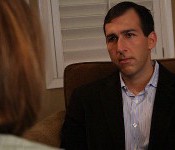
I’m always confused when my colleagues say to me that adults just take lessons for therapy. Half the problem is these teachers misunderstand psychotherapy. Therapy is being responsible for the mental health of an individual client and, I assure you, I never assume that responsibility. It is not my place; I am not qualified; it is not why my students come to me. My students would be insulted if they thought I felt it was.
For some people, talking about anger, frustration, and disappointment seems like therapy. It doesn’t feel that way to me. I feel it’s part of being a human being. I talk about emotions with my friends and with my children. It’s not therapy; it’s the way caring people relate to one another.
I do pay attention to the feelings of students of any age. Emotion is an important component of education and certainly emotion is vital in making music. Being aware and present to the students’ feelings are crucial elements of good teaching.
This includes paying attention to what students feel when they first come into their lessons. If they come into a lesson with something on their minds, they are not going to learn much until they get a chance to acknowledge what distracting them. I always ask how they’re doing before we begin a lesson. Unless I allow them a few moments of transition, it’s hard for both of us to be fully present at the lesson. If students are not fully present, learning is impossible.
It’s true that sometimes students haven’t practiced much and would rather talk so they don’t have to play. I remember doing that myself, on several occasions, in fact. I usually point this out and then we proceed with our work.
Teachers may be surprised by the importance they assume for our adult students. It’s worth remembering that children have many teachers; piano teachers are one among many for them. Most likely, we teachers are the only teachers of our adult students. Given the lives of most adults, we may be the only people who work with them one to one outside of work of family. The result is that we may become more important to our students than either the student or teacher expects. This importance may partly explain the confusion with therapy.
One area more directly therapeutic does occur if the student had an abusive teacher in the past. In this case, the student will wait to see how the current teacher handles things. In What I Learned about Teaching Children from Teaching Adults two examples of this are given.
Working this problem through takes time and it cannot be rushed. Progress can be quite slow because so much of the students’ energy is used for hypervigilance. They are cautious. They need to see how things will play out. Teachers’ patience, kindness, and understanding are the keys to success. The more awareness the student brings to the problem, the better and faster the result.
